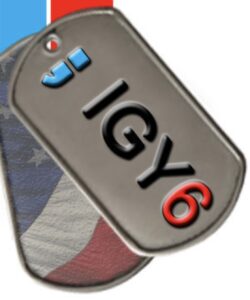- Home
- About
- Benefits & Services
- State Veterans Homes
- Nevada Veterans Memorial Cemeteries
- Community
- News
- Suicide Prevention
- Donate
- Fallen Heroes
- Nevada’s Veterans Memorials
- Calendar/Events
- Nevada Transition Assistance Program (NVTAP)

For many veterans and their families, September can be a rough month. Current events, along with the anniversary of 9/11 and Suicide Prevention Month, may hit close to home for many.
As an issue widely discussed among the veterans’ community, the values from the military to accomplish the missions led to a saying being repurposed to help prevent suicide. The saying goes “I Got Your Six” and is usually seen on Facebook and Twitter abbreviated as (IGY6).
It comes from servicemembers training to always have their buddy’s back in their time of need. For our September Veteran of the Month (VOM) this is something he’s taken to heart. Jesse Tiffany has taken on new missions, since leaving the military. He is a passionate advocate of suicide prevention and has been raising funds for Project Recover, as an active member of VFW Post 3396.
As he tells it, his passion comes from his own experience and struggles with mental health following his retirement from the Army. As a survivor of a suicide attempt, he tries to live by the saying “I Got Your Six” as he works to ensure that no other family will have to experience the turmoil caused by the scourge of suicide whether attempted or completed.
While he had been a member of the VFW for some time, after his suicide attempt, he rededicated his life to becoming a better person for his family and community. As he sought new ways to help his brothers in arms, he decided to pursue training with NDVS and the Nevada Office of Suicide Prevention where he became safeTALK and A.S.I.S.T. certified.
These trainings all came in handy while on his tour of the country raising money for Project Recover. One day, while facing bad fortune mid-trip, he stopped to talk to the receptionist of his hotel. This young lady had unfortunately been through some narrow straights, and he could see an emptiness that he had once seen in himself. With this realization, and when she asked about his IGY6 tattoo, he sparked up a conversation with her and learned of her experiences and challenges in life. By doing so, she opened up to him about what she intended to do that night, had he not taken a moment to ask how she was doing. As the conversation went on, he opened up about his own experience and how resources in the community and his family had ultimately saved him. As they talked, he helped guide her to connect with similar resources.
While asking how someone is doing seems simple, for someone in crisis and a trained advocate, this can be a lifesaving opening for a conversation. It’s an opening that allows an advocate to connect the person to resources that can help guide them through this time of pain.
We ask that our readers interested in helping prevent suicide, please visit https://veterans.nv.gov/benefits-and-services/suicide-prevention/ to learn more about trainings available and to connect with our Suicide Prevention Manager Sarah Hogue to become more involved.